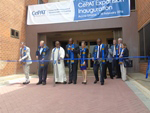FOR IMMEDIATE RELEASE
CONTACTS:
- Jessica Freifeld, +254 714 291 222, JFreifeld@globalhealthstrategies.com
- Latifa Boyce, +1 301 816 8229; lmb@usp.org
 Accra, Ghana, February 10, 2016 — In response to concerns about substandard and counterfeit medicines and a growing demand for quality-assured medicines in Africa, the United States Pharmacopeial Convention’s (USP) Center for Pharmaceutical Advancement and Training (CePAT) in Accra, Ghana, has expanded its quality control testing and training capabilities and today opened a new pharmaceutical microbiology laboratory.
Accra, Ghana, February 10, 2016 — In response to concerns about substandard and counterfeit medicines and a growing demand for quality-assured medicines in Africa, the United States Pharmacopeial Convention’s (USP) Center for Pharmaceutical Advancement and Training (CePAT) in Accra, Ghana, has expanded its quality control testing and training capabilities and today opened a new pharmaceutical microbiology laboratory.
CePAT was launched in 2013 with the aim of providing high-quality analytical and training services to help strengthen the capacity of national regulatory authorities to detect counterfeit and substandard medicines and of pharmaceutical manufacturers to sustainably ensure the quality of their products. Over the past three years, CePAT has trained approximately 190 professionals from 32 African countries on a wide-range of pharmaceutical regulatory, quality assurance and quality control functions.
“USP is working to help build Africa’s capacity to tackle the growing threat of counterfeit and substandard medicines, a major public health challenge on the continent. We are committed to being one of Africa’s most trusted partners and a resource for the quality control of medicines. We are collaborating with global, regional and local partners to ensure people in Africa have medicines they can rely on to be of good quality, safe and beneficial,” says Kelly Willis, USP’s Senior Vice President for Global Public Health.
Building on CePAT’s existing training offerings, the expanded center will now offer unique hands-on training for the regulatory and manufacturing sectors and additional quality control tests and preventative maintenance of analytical equipment. It will also offer microbiology courses and French language versions of its courses.
Specifically, USP Ghana’s new microbiology laboratory and training facility will help provide pharmaceutical and regulatory professionals across Africa with the skills to detect medicines that have been contaminated by micro-organisms, including bacteria. The new lab can also respond to the demand for microbiological testing of medicines and help fill testing gaps in the region.
Historically, microbiology testing has been challenging in resource-limited settings due to its complexity and the technology required for maintaining a clean room, or sterile, environment. This first-of-its-kind microbiology laboratory from USP in sub-Saharan Africa was purposefully designed to operate independently of its surroundings by creating its own clean room environment. This makes the laboratory an ideal model for other countries in Africa to replicate.
“This new technology and expanded training facility could be truly game-changing for Africa,” says Patrick Lukulay, USP’s Vice President of Global Health Impact Programs in Africa. “Millions of Africans are depending on national regulatory systems to ensure the quality and safety of their medicines and, too often, these systems cannot deliver. At USP, we are seeking to change that – and urgently.”
In many African countries, regulatory systems are not equipped to detect substandard or counterfeit medicines and remove them from the market. Often, policies preventing their sale and distribution are either lacking or not followed.
The costs of poor-quality medicines in African countries are enormous. It is estimated that more than 122,000 African children under the age of five die each year because of counterfeit antimalarials alone. Countless more individuals face failed treatments or fall into poverty because of the costs of procuring additional medicines or paying for hospitalizations.
On a broader scale, counterfeit and substandard medicines are contributing to the emergence of drug-resistant strains of microbes that cause diseases, such as malaria, tuberculosis and other infections. Drug resistance renders even quality-assured treatments ineffective and, thus, deadly diseases virtually untreatable, posing a grave threat to public health, not only in Africa, but globally.
Moving forward, USP plans to provide scholarships to 12 regulatory professionals from six African countries every two months, with the ultimate aim of building a cadre of well-trained individuals who can help ensure that medicines reaching Africans are safe, effective and beneficial.
